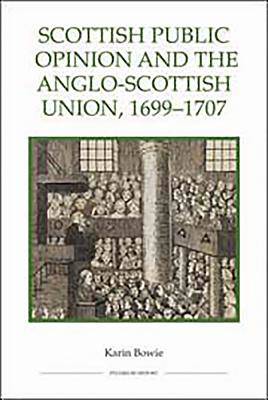
- Afhalen na 1 uur in een winkel met voorraad
- Gratis thuislevering in België vanaf € 30
- Ruim aanbod met 7 miljoen producten
- Afhalen na 1 uur in een winkel met voorraad
- Gratis thuislevering in België vanaf € 30
- Ruim aanbod met 7 miljoen producten
Zoeken
Scottish Public Opinion and the Anglo-Scottish Union, 1699-1707
Karin Bowie
€ 59,95
+ 119 punten
Uitvoering
Omschrijving
In the early modern period, ordinary subjects began to find a role in national politics through the phenomenon of public opinion: by drawing on entrenched ideological differences, oppositional leaders were able to recruit popular support to pressure the government with claimed representations of a national interest. This is particularly well demonstrated in the case of the Anglo-Scottish union crisis of 1699-1707, in which Country party leaders encouraged remarkable levels of participation by non-elite Scots. Though dominant accounts of this crisis portray Scottish opinion as impotent in the face of Court party corruption, this book demonstrates the significance of public opinion in the political process: from the Darien crisis of 1699-1701 to the incorporation debates of 1706-7, the Country party aggressively employed pamphlets, petitions and crowds to influence political outcomes. The government's changing response to these adversarial activities further indicates their rising influence. By revealing the ways in which public opinion in Scotland shaped the union crisis from beginning to end, this book explores the power and limits of public opinion in the early modern public sphere and revises understanding of the making of the British union. Dr KARIN BOWIE lectures in History at the University of Glasgow.
Specificaties
Betrokkenen
- Auteur(s):
- Uitgeverij:
Inhoud
- Aantal bladzijden:
- 208
- Taal:
- Engels
- Reeks:
- Reeksnummer:
- nr. 56
Eigenschappen
- Productcode (EAN):
- 9781843836513
- Verschijningsdatum:
- 15/09/2011
- Uitvoering:
- Paperback
- Formaat:
- Trade paperback (VS)
- Afmetingen:
- 156 mm x 234 mm
- Gewicht:
- 290 g

Alleen bij Standaard Boekhandel
+ 119 punten op je klantenkaart van Standaard Boekhandel
Beoordelingen
We publiceren alleen reviews die voldoen aan de voorwaarden voor reviews. Bekijk onze voorwaarden voor reviews.








